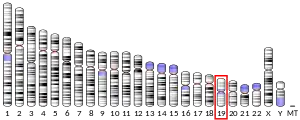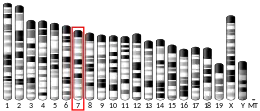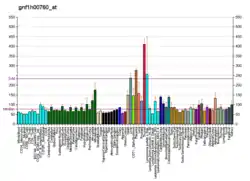AKT1S1
Proline-rich AKT1 substrate 1 (PRAS) is a protein that in humans is encoded by the AKT1S1 gene.[5][6]
References
- GRCh38: Ensembl release 89: ENSG00000204673 - Ensembl, May 2017
- GRCm38: Ensembl release 89: ENSMUSG00000011096 - Ensembl, May 2017
- "Human PubMed Reference:". National Center for Biotechnology Information, U.S. National Library of Medicine.
- "Mouse PubMed Reference:". National Center for Biotechnology Information, U.S. National Library of Medicine.
- Kovacina KS, Park GY, Bae SS, Guzzetta AW, Schaefer E, Birnbaum MJ, Roth RA (Mar 2003). "Identification of a proline-rich Akt substrate as a 14-3-3 binding partner". The Journal of Biological Chemistry. 278 (12): 10189–94. doi:10.1074/jbc.M210837200. PMID 12524439.
- "Entrez Gene: AKT1S1 AKT1 substrate 1 (proline-rich)".
External links
- Human AKT1S1 genome location and AKT1S1 gene details page in the UCSC Genome Browser.
Further reading
- Maruyama K, Sugano S (Jan 1994). "Oligo-capping: a simple method to replace the cap structure of eukaryotic mRNAs with oligoribonucleotides". Gene. 138 (1–2): 171–4. doi:10.1016/0378-1119(94)90802-8. PMID 8125298.
- Suzuki Y, Yoshitomo-Nakagawa K, Maruyama K, Suyama A, Sugano S (Oct 1997). "Construction and characterization of a full length-enriched and a 5'-end-enriched cDNA library". Gene. 200 (1–2): 149–56. doi:10.1016/S0378-1119(97)00411-3. PMID 9373149.
- Saito A, Narasimhan P, Hayashi T, Okuno S, Ferrand-Drake M, Chan PH (Feb 2004). "Neuroprotective role of a proline-rich Akt substrate in apoptotic neuronal cell death after stroke: relationships with nerve growth factor". The Journal of Neuroscience. 24 (7): 1584–93. doi:10.1523/JNEUROSCI.5209-03.2004. PMC 6730448. PMID 14973226.
- Beausoleil SA, Jedrychowski M, Schwartz D, Elias JE, Villén J, Li J, Cohn MA, Cantley LC, Gygi SP (Aug 2004). "Large-scale characterization of HeLa cell nuclear phosphoproteins". Proceedings of the National Academy of Sciences of the United States of America. 101 (33): 12130–5. Bibcode:2004PNAS..10112130B. doi:10.1073/pnas.0404720101. PMC 514446. PMID 15302935.
- Jin J, Smith FD, Stark C, Wells CD, Fawcett JP, Kulkarni S, Metalnikov P, O'Donnell P, Taylor P, Taylor L, Zougman A, Woodgett JR, Langeberg LK, Scott JD, Pawson T (Aug 2004). "Proteomic, functional, and domain-based analysis of in vivo 14-3-3 binding proteins involved in cytoskeletal regulation and cellular organization". Current Biology. 14 (16): 1436–50. doi:10.1016/j.cub.2004.07.051. PMID 15324660.
- Huang B, Porter G (Oct 2005). "Expression of proline-rich Akt-substrate PRAS40 in cell survival pathway and carcinogenesis". Acta Pharmacologica Sinica. 26 (10): 1253–8. doi:10.1111/j.1745-7254.2005.00184.x. PMID 16174443.
- Kimura K, Wakamatsu A, Suzuki Y, Ota T, Nishikawa T, Yamashita R, Yamamoto J, Sekine M, Tsuritani K, Wakaguri H, Ishii S, Sugiyama T, Saito K, Isono Y, Irie R, Kushida N, Yoneyama T, Otsuka R, Kanda K, Yokoi T, Kondo H, Wagatsuma M, Murakawa K, Ishida S, Ishibashi T, Takahashi-Fujii A, Tanase T, Nagai K, Kikuchi H, Nakai K, Isogai T, Sugano S (Jan 2006). "Diversification of transcriptional modulation: large-scale identification and characterization of putative alternative promoters of human genes". Genome Research. 16 (1): 55–65. doi:10.1101/gr.4039406. PMC 1356129. PMID 16344560.
- Olsen JV, Blagoev B, Gnad F, Macek B, Kumar C, Mortensen P, Mann M (Nov 2006). "Global, in vivo, and site-specific phosphorylation dynamics in signaling networks". Cell. 127 (3): 635–48. doi:10.1016/j.cell.2006.09.026. PMID 17081983.
- Vander Haar E, Lee SI, Bandhakavi S, Griffin TJ, Kim DH (Mar 2007). "Insulin signalling to mTOR mediated by the Akt/PKB substrate PRAS40". Nature Cell Biology. 9 (3): 316–23. doi:10.1038/ncb1547. PMID 17277771. S2CID 12827916.
- Sancak Y, Thoreen CC, Peterson TR, Lindquist RA, Kang SA, Spooner E, Carr SA, Sabatini DM (Mar 2007). "PRAS40 is an insulin-regulated inhibitor of the mTORC1 protein kinase". Molecular Cell. 25 (6): 903–15. doi:10.1016/j.molcel.2007.03.003. PMID 17386266.
- Wang L, Harris TE, Roth RA, Lawrence JC (Jul 2007). "PRAS40 regulates mTORC1 kinase activity by functioning as a direct inhibitor of substrate binding". The Journal of Biological Chemistry. 282 (27): 20036–44. doi:10.1074/jbc.M702376200. PMID 17510057.
- Fonseca BD, Smith EM, Lee VH, MacKintosh C, Proud CG (Aug 2007). "PRAS40 is a target for mammalian target of rapamycin complex 1 and is required for signaling downstream of this complex". The Journal of Biological Chemistry. 282 (34): 24514–24. doi:10.1074/jbc.M704406200. PMID 17604271.
This article is issued from Wikipedia. The text is licensed under Creative Commons - Attribution - Sharealike. Additional terms may apply for the media files.




